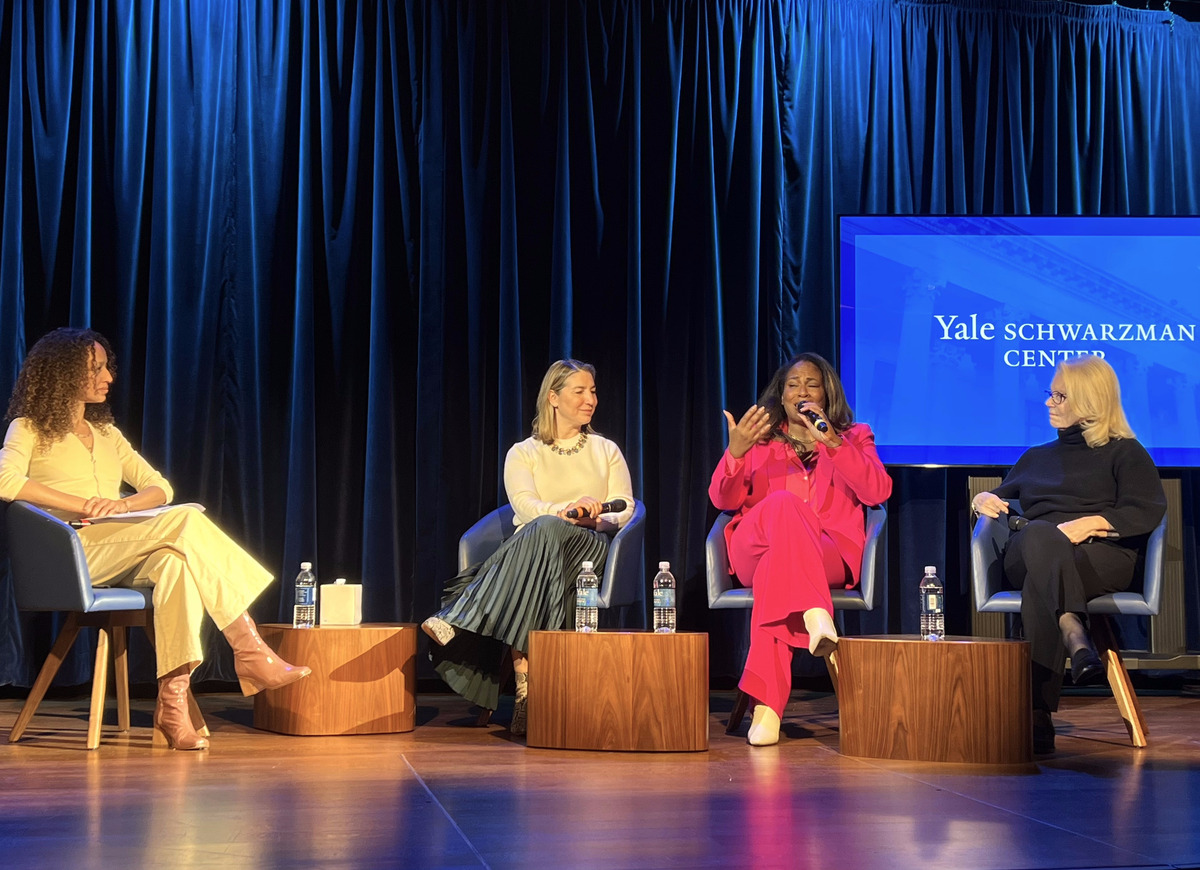Schwarzman Center hosts conversation with leading women in the entertainment industry
Daryl Roth, Kamilah Forbes and Zibby Owens spoke on motherhood, COVID-19’s impact on the entertainment industry and advice for blooming creatives.

Jane Park, Contributing Photographer
Being a creative isn’t easy — paths to success are almost never straightforward.
That’s especially true for women creatives. On Nov. 17, three leading women in the entertainment industry — Broadway producer Daryl Roth, Theater executive Kamilah Forbes, and publishing CEO Zibby Owens ’98 — gathered for a panel at Yale’s Schwarzman Center to discuss their similar and yet unique experiences as established figures in their fields.
When asked to share their stories and experiences, Roth, Forbes, and Owens remarked on their tumultuous, yet fulfilling journeys to success. When Roth began her career as a producer, she stated that there were few experienced producers willing to mentor a woman. However, she learned to overcome the stereotypes associated with women in leadership positions
“People will say to you, ‘Women take things so personally,” Roth told the crowd. “I’ve heard this 100 times, and I say ‘Yes, we do. And that’s why we’re good.”
Roth added that she is always mindful of being the last voice in the room, rather than the loudest.
That axiom has pushed forward her advocacy work for diversity in the theater production industry. In an interview with the News, Roth described how she was motivated to find representation in theater for her son, Jordan, who is gay. She recalled bringing Jordan to an Ian McKellen show to show Jordan that “in theater, you can be true to yourself.”
Creative work has “enabled” Owens to navigate a challenging period of her life after a series of COVID-19 deaths in her family.
“I actually found that the pandemic was a chance to be even more productive and creative with how to create community around books and get authors’ words into people’s hand,” Owens said. “I took my podcast, made it an Instagram Live show for the first three months … I started a virtual book club, which I still do, and authored essays, which eventually became an anthology.”
Owens did not follow a straightforward journey in her creative career. In fact, Owens’ decision to pursue writing seriously was sparked by the death of her close friend, Stacey Sanders ’98, who died in the attacks on Sept. 11, 2001.
“I decided, among other things which made me rethink my whole life and the meaning of life, that if I was going to be killed at my desk, doing my job, that I better bring my whole self to whatever I was doing and I could no longer just sit and market Pepperidge Farm cookies for an ad agency,” said Owens.
During the talk, Forbes recalled her years spent at Howard University’s theater program, where she encountered many “classic” Black playwrights including Adrienne Kennedy and Douglas Turner Ward.
Still, she noticed a generational gap in Black representation, which led her to create the Hip Hop Theater Festival and eventually work with artists such as Danny Hawk and Lin-Manuel Miranda.
“I didn’t quite see my generation reflected,” Forbes said. “We did so much August Wilson, but then as a 19-year-old student, there was no role for me to play. I come from the hip-hop generation. Therefore, the theater that I was really interested in is ‘How can my culture and generational voices be reflected on the stage?’”
Both Owens and Forbes reflected on the uncertainties of COVID-19; both of their teams worked to make content during that period more accessible and responded actively to the needs of their audiences.
As an important center for African American culture and art, Forbes said, Apollo Theatre worked to respond to the national outrage surrounding the murders of Breonna Taylor and George Floyd,
But the pandemic required the theater to connect to audiences through different mediums. Forbes’ team produced a film-adaptation of Ta-Nehisi Coates’ book, “Between the World and Me,” in collaboration with HBO. The film was released in November 2020.
Despite the difficulties and uncertainties in pursuing a career in entertainment, all three panelists urged students to follow their instincts and passions.
“You have to really put on blinders in a way,” Roth said. “Just bring in what you think is right for you. If it’s right for you, it’s right. If it’s a failure, which is a word that I use in quotes because I don’t believe in failure, you have nobody to blame but yourself, you learn from it and you move on. It’s hills and valleys, hills and valleys.”
The Schwarzman Center was endowed in 2015.







